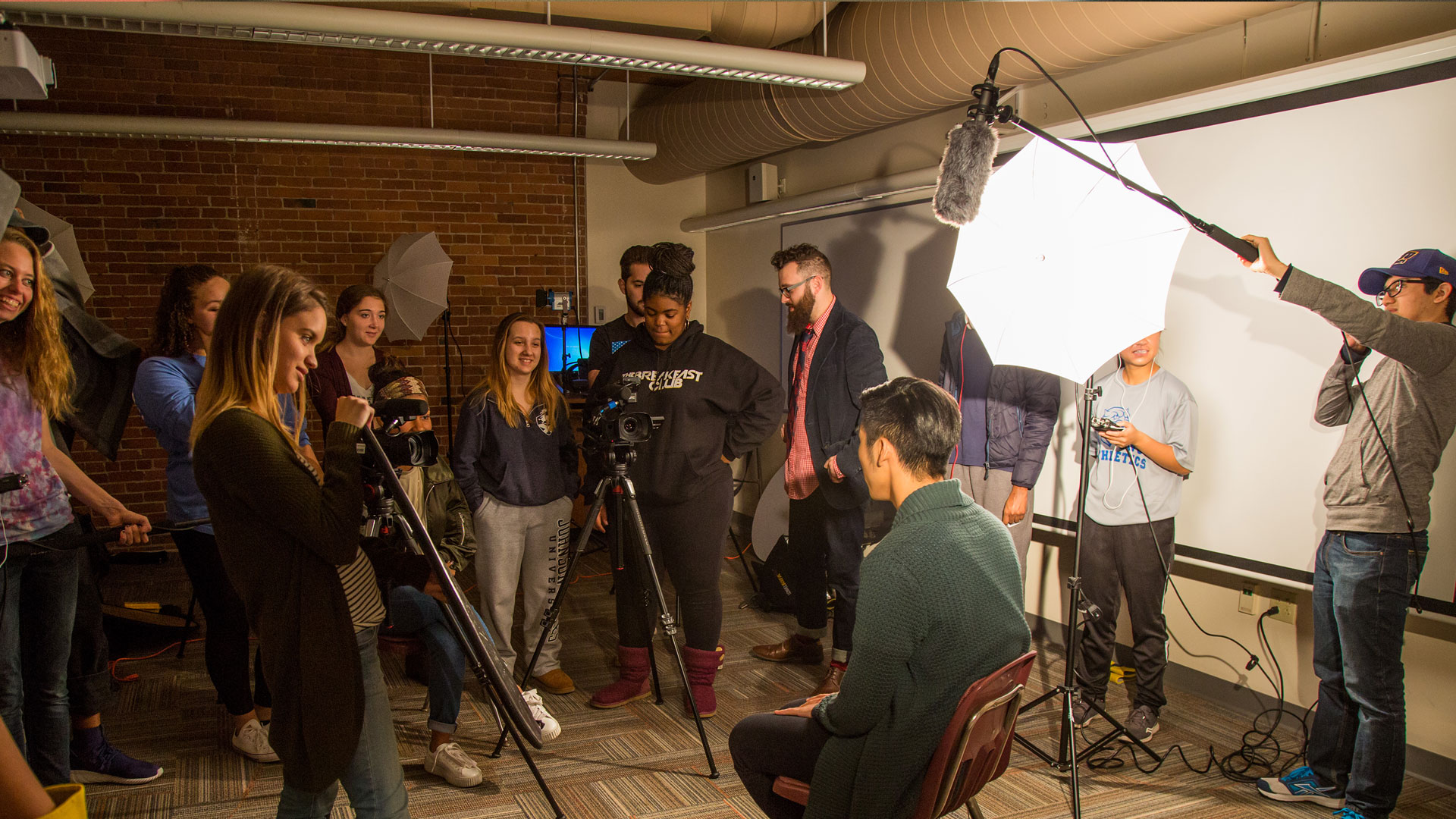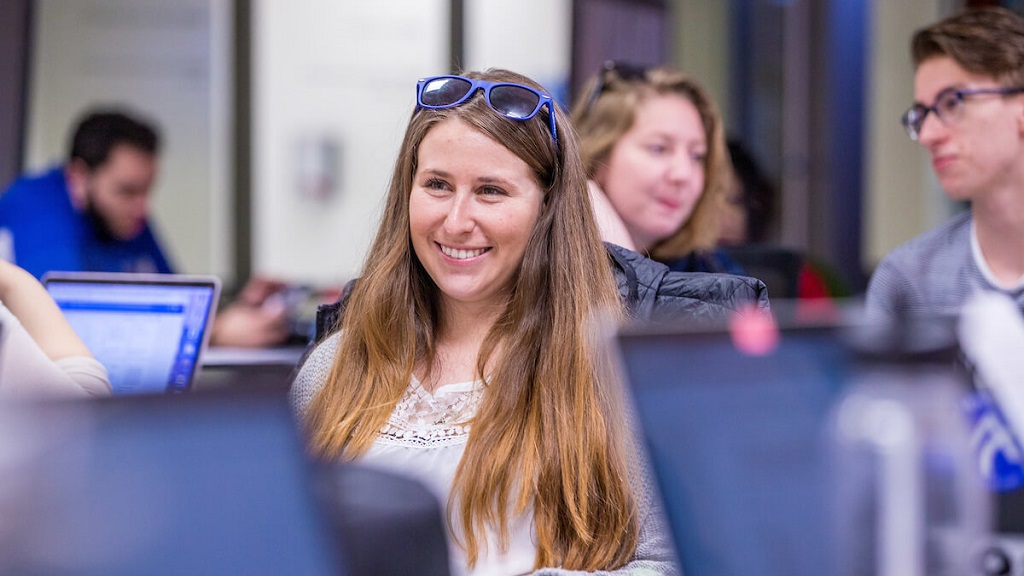Bachelor of Science
Design
Designing with Purpose
If you love to create visually captivating illustrations and dream of inspiring others through your work — this is the place for you. You can pursue your passion for design in the heart of the Creative Capital in Rhode Island. Providence earned this nickname for its colorful landscape of murals, numerous galleries and museums, large population of artists, and a thriving job market for creative professions. The best part is, Johnson & Wales University can put you in the middle of it all.
In our specialized design labs and studios, you’ll learn to solve visual communication problems using design and digital tools, including current design software and hardware. You’ll narrow your studies after the first two years by choosing to focus on either print or user experience design. It’s how we help you find your career path.
“If I can put one word on my general experience, it would definitely be holistic,” says Noah Fye '23, a recent graduate of the Design program. “Everything about the design department is designed to get you to be a professional. Everything comes in and it's all focused on making you the best designer you can be.”
Ready to become the best designer you can be? Keep scrolling to discover how you can do it at JWU Providence.
Request Information
New! Choose a Three-Year or Four-Year Bachelor’s Degree
You now have the option to earn your Design bachelor’s degree in either three or four years. Our new Career-Focused Degree Program lets you complete your degree in just three years with a streamlined, 90-credit curriculum. This option allows you to enter the workforce sooner and save on tuition while still receiving the same quality education and hands-on experiences JWU is known for. If you prefer a more traditional pace, the four-year degree path is also available, offering the same rigorous preparation for your future career.
Experiential Education
At JWU, we’re all about putting your learning into action and offering you the opportunity to work on real projects that go beyond the classroom. Whether you design for clients in the community on Design Team or collaborate with other JWU programs on exciting projects in a Directed Experiential Education course, you’ll be creating work that makes a difference and that many people will get to see and enjoy.
Why Study Design at JWU?
- You’ll build a portfolio of increasingly sophisticated design work.
- Develop a focused identity that carries through all your presented materials, and identifies you as an independent graphic designer.
- Hone your graphic design skills by creating, editing and presenting visual collateral that includes the design of branding, logos, packages, publications, photography, video, typography, websites and user interface experiences.
- Gain industry experience by creating, managing and presenting design projects to actual clients from community-based organizations in the greater Providence area.
Concentrations
Brands and organizations rely on compelling visuals to communicate across digital and print platforms, and graphic designers are essential in shaping how messages are seen, understood and experienced. In this concentration, you’ll delve into visual hierarchies, text composition and layout, multi-page layouts, typography, color theory and other key topics.
Digital products are more immersive, intelligent and interconnected than ever before, and web designers are at the forefront of crafting intuitive interfaces and seamless user journeys across web, mobile and emerging platforms. In this concentration, you’ll learn about user interface design, coding languages, interaction design, web accessibility, motion graphics, style guides and other key concepts. You’ll practice using industry-standard design and prototyping software and create a portfolio to showcase your work.
Many of today’s products are increasingly intelligent, operating within digital and physical ecosystems. This concentration dives deeper into ergonomics and user experience, package design, material properties, prototyping, shelf presence, modeling and more. Designers learn to harness cutting-edge technologies like artificial intelligence, augmented and virtual reality, and sustainable materials to deliver personalized, interactive and eco-conscious solutions to product creation.
Design Labs and Classrooms
The Bowen Gallery
Student work is displayed year-round in this beautiful gallery space in the John J. Bowen Center for Science & Innovation, the same building where you will also take your design courses.
The Innovation Lab
This unique lab is open to students from any major and includes everything from scanners to the latest fabrication equipment, including 3D printers, laser engravers, micro mills, and vinyl cutters. It’s a great place for Design students to bring their ideas to life!
Explore The Bowen Gallery
Sample Courses
- Brand Identity Design & Development
- Design Thinking & Creative Process
- Editorial & Publication Design
- Package Design
- Typography
- User Experience & Content Design I & II
- Vector Drawing & Image Editing
- Wayfinding & Environmental Graphics
In addition to classes, free elective credit can be applied to a number of options such as Directed Experiential Education (DEE), internship, minor or study abroad. You are encouraged to contact an advisor before scheduling free elective credits. Explore the full JWU Catalog course listing:
Career Possibilities
- Creative Director
- Creative Design Specialist
- Editorial Designer
- Package Designer
- Visual Designer
- User Interface/Experience (UI/UX) Designer
- Web Designer
- Product Designer
Some professions may require additional study, background checks, certifications, licenses, exams and/or experience as required qualifications for employment. Students are responsible for verifying that they can meet the employment requirements of potential employers.
Powered by Purpose: Ally Buckley ’24
“When I leave JWU, I will be prepared for whatever comes next — I will leave with a portfolio and a personal brand,” says Design student Ally Buckley '24. The recent graduate shares what she loves about the program and her excitement to continue exploring visual communication.
Featured Faculty
Our professors and instructors are dedicated to the success of our students. Learn more about our expert faculty members.

Associate Professor
My specialty is the experiential ed courses that we offer students. They meet with clients, develop project briefs, and go through all the phases of design creating logos, print design, web design and video.

Jonathan Harris
Harris has worked his professional life to create walkable and bikeable cities. He teaches the process, management and tools of design.
Related Programs
Visit JWU
Explore where you’ll live, learn, and enjoy all campus has to offer.
Schedule an In-Person Tour


